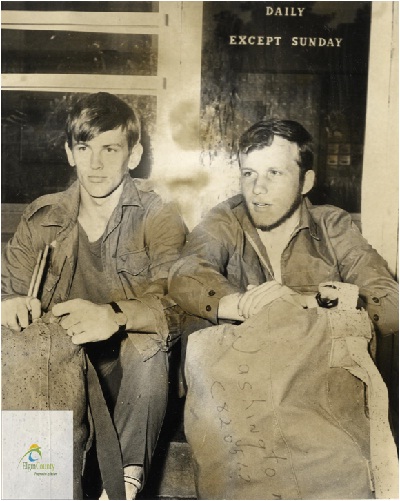The Workers

In July 1968, transient tobacco workers were beginning to move into the tobacco belt area of Aylmer, Tillsonburg and Delhi but were finding that the harvest that year was two weeks later than usual. Wayne Desjardins, 18, of Pembroke, and his travelling companion Herb Buske, 19, also of Pembroke, had hitch-hiked from their home town to the area in search of work. They intended to travel to the Leamington area and work there in the vegetable harvest then return to the Aylmer area two weeks later to work in tobacco. They were both students. Herb intended to save enough money to enter agricultural college in the fall and Wayne, who was going into Grade 11, wanted to buy a $500 bond with his money earned in tobacco.
St. Thomas Times-Journal fonds, C8 Sh2 B2 F5 10.
While most farm hands were not paid particularly well, tobacco farmers were known for compensating workers for the gruelling work. Also, most workers could expect room and board in addition to their pay. However, many farmers would hold back part of each worker's wages to be given out as a bonus at the end of the harvest. This was to encourage workers to stay for the full duration since many would-be primers could not endure the hard labour (and sometimes tough living conditions) that came with the job. Those who did, stood to make a lot of money in a short period of time. These seasoned workers returned to Elgin County year after year looking for employment in the tobacco fields. Early in the 20th century many of those working in the tobacco fields were European immigrants who saved their money to eventually purchase tobacco farms of their own. Transient workers, many from Quebec, moved from job to job, sometimes working their way all over North America, temporarily swelling town populations during the summer and leaving for other work when the tobacco harvest was over.
In the later part of the 20th century, it became more difficult to find dedicated transient workers to bring in the harvest. Offshore workers were perceived as steady and dependable. Migrant workers from Jamaica, Barbados, Mexico, and other southern countries were increasingly brought in for the season and returned home when the harvest was done. About half of seasonal tobacco workers would find jobs through the Canada Farm Labour Pool or a Canada Employment Centre, while the rest would be hired directly by the farmer after arriving in town. There were also movements to bring farm hands in under unions, which prompted many tobacco farmers to finally move to automated harvesting. Automated harvesters were expensive, but allowed farmers to reduce the number of workers needed from around ten to two or three, usually local students or labourers.
Tobacco in
Elgin County :
Production :
- Preparation
- Transplanting
- In The Field
- Harvest
- Into the Kiln
- Flue-Curing
- Baling
- Crop Damage
- The Workers